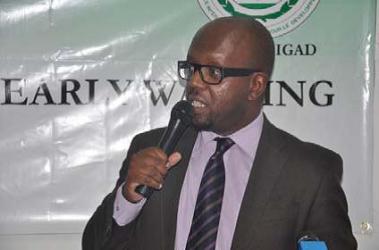S. Sudan to develop conflict early warning and response strategy
By Julius N. Uma
June 15, 2012 (JUBA) — Alarmed by the high rate of conflict among its
communities, various stakeholders in South Sudan on Tuesday resolved
to develop a conflict early warning and early response strategy,
widely seen as a mechanism for monitoring, information sharing and
conflict prevention.

taken by the high level technical policy organs of the
Inter-Governmental Authority on Development’s (IGAD) Conflict Early
Warming and Response Mechanism (CEWARN), which was established in
2002.
While officially opening the two-day meeting, Chol Luot, the
chairperson South Sudan Peace and Reconciliation Commission (SSPRC),
said the state-owned institution is delighted to be part of the plan
to adopt he seven-year strategy, adding that SSPRC will fully support
IGAD in efforts to successfully implement the conflict early warning
and early response initiative.
“The situation South Sudan is experiencing currently requires the
urgent implementation of early warning systems. My commission [South
Sudan Peace and Reconciliation Commission] will fully support IGAD and
its partners as we strive to reduce or prevent conflicts in the
country,” he said.
The SSPRC chairperson, also head of the recently launched Conflict
Early Warning and Early Response Unit (CEWERU) in South Sudan,
specifically cited the urgent need for conflict early warning systems
in states that border other neighboring countries to reduce
territorial-related or land disputes.
Martin Kimani, the director for CEWARN described early warning systems
as a direct approach to governance through conflict prevention, which
he said should involve the active participation all stakeholders in
communities.
“The success of the early warning and early response strategy will
entirely depend on how well the citizen understand conflict, its
causes and how it can be prevented from society,” Kimani said.
The new strategy, Sudan Triune has learned, will entail an expanded
thematic and geographic scope with the new areas of reporting in
Somalia, Sudan, South Sudan and other member states. CEWARN will, as
part of the process, closely monitor and drive response to conflicts
linked to food insecurity, degradation, volatile climate and migration
related issues.
According to Kimani, CEWARN has adopted a bottom-up approach in
developing the new strategy plan, with a strong focus on local
community needs and perspectives regarding the current dynamics of
cross-border peace in security.
“The plan is also intended to build on CEWARN’s experience and
strength in terms of informing national and regional conflict early
warning, response and peace building practices and linking them with
local practice,” he said.
IGAD, according to Kimani, has come up with a Rapid Response Fund
(RRF) which will be used to directly quickly respond to emergency
situations, through sponsoring negotiations, which is seen as a
beginning process before the involvement of key actors like
government.
“Sometimes these funds can be used to set up a water project for
communities, but it has to start with first consulting the communities
on what they actually need,” he said.
Describing the RRF as a “modest” fund, the CEWARN director said with
the existence of so many conflicts and problems in society today,
South Sudan being IGAD’s newest member seeks to gain a lot from the
other countries, hence capable of becoming the “leading” nation in
conflict prevention and peace.
In 2002, several countries, including Sudan, ratified the much-hyped
protocol to prevent conflicts, in the aftermath wars that occurred in
Rwanda, and other African countries. However, South Sudan, which is
yet to ratify the protocol, has already embarked on conflict
prevention process, evidence by last month’s successful launch of its
early warning and early response unit under the SSPRC.
(ST)
